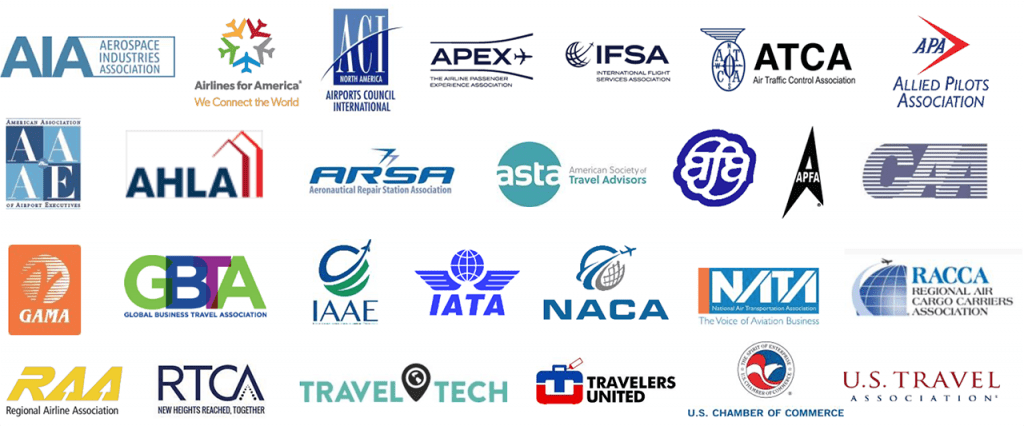Standardized Health Credentials will allow travel and tourism to soar across the planet
Travelers United has been working tirelessly behind the scenes with other stakeholders in the travel and tourism industry to bring back travel. We have urged the creation of international standardized health credentials.
A healthy international travel industry is, clearly, the goal of airlines, airports, hotels, pilots, flight attendants, and consumers. Organizations from business travel to aircraft manufacturers and from travel technology to travel advisors are working together.
A group of our organizations from all corners of travel and tourism just sent a joint letter to President Biden’s COVID-19 Response Team. They have joined together to urge the administration response team to create standardized COVID-19 health credentials (CHC) for travelers.
Standardized federal guidance will result in international benefits
This CHC should cover both tests and vaccinations. Standardized federal guidance will result in international benefits, including:
- Improving the efficiency and accuracy of verifying health records;
- Strengthening countries’ risk mitigation efforts;
- Preserving the privacy of passenger health data;
- Expanding the use of testing and vaccinations as an additional layer of protection against the virus; and
- Accelerating safe economic activity and recovery.
It is crucial to establish uniform guidance for CHCs. Global efforts to create CHCs are already underway. While we understand and support the critical need for an internationally harmonized approach, the U.S. must be a leader in this development. The current diverse and fragmented digital health credentials used to implement different countries’ air travel testing requirements risk causing confusion, reducing compliance, and increasing fraud.
Standardized federal guidelines are important in order to lead gobal changes

Currently, the World Health Organization (WHO) and the International Civil Aviation Organization (ICAO) are working closely. They are identifing the necessary information that would be contained in a medical record and a travel document. We also strongly encourage the US interagency working group, including the CDC and the State Department, to proactively develop a roadmap for the rollout of recommended travel documentations and build a system supporting CHCs that verify both testing and vaccination records.
The federal efforts should be coordinated with travel and tourism stakeholders and consumers
These federal efforts should be done in coordination with airlines, airports, unions, and other key stakeholders. In addition, some of the principles that should shape the development of federal guidance for CHCs include:
- Simple and secure identity verification by ensuring identities can be verified through commonly accepted source documents, biometrics, or other forms of travel identification;
- Privacy-driven displays of personal health records by establishing a clear means of displaying the traveler’s testing and/or vaccine status (i.e. red/green);
- Interoperability across jurisdictions by ensuring CHCs can be validated by local, state, and federal agencies, private businesses, and foreign governments;
- Tied to records of health care providers to validate the legitimacy of the test or vaccine records;
- Capable of rules-based processing, which eliminates the need for airports and crewmembers to know multiple jurisdictional requirements;
- Strong protections for personal data by complying with applicable privacy laws and information security best practices;
- Compliance with federal regulations for laboratory results;
- Compliance with international health data standards; and
- Configured with open source data and coding to ensure connectivity to labs and existing health data systems, so test results can be confirmed as valid.
Digital COVID-19 health credentials can benefit all aspects of tourism
Standardized health credentials have the potential to benefit more than just air travel. It could encourage more widespread adoption of processes to verify testing and vaccination records. These benefits will spread to sports arenas and restaurants, business meetings and theme parks, and more. CHCs could expand the number of businesses that can easily use testing and vaccination practices, in addition to physical distancing, mask wearing, enhanced sanitation, and other protections.
READ ALSO:
Digital Health Pass
Mandatory COVID vaccinations?
Why proof of vaccination and virus tests are too easy to fake
We are committed to working in partnership with the White House
We will use our collective expertise to develop and implement risk-based, data-driven public health measures that enhance public safety. Continue to look to us to provide input from all travel stakeholders as you develop additional measures to ensure that implementation will be timely, smooth, and effective.
These groups have signed onto this letter:
Aeronautical Repair Station
Association Aerospace Industries Association
Air Traffic Control Association
Airline Passenger Experience Association
Airlines for America
Airports Council International-North America
American Association of Airport Executives
Allied Pilots Association
American Hotel and Lodging Association
American Society of Travel Advisors
Association of Flight Attendants – CWA
Association of Professional Flight Attendants
Cargo Airline Association
General Aviation Manufacturers Association
International Air Transport Association
Global Business Travel Association
International Association of Airport Executives
International Flight Services Association
National Air Carrier Association
National Air Transportation
Association Radio Technical Commission for Aeronautics
Regional Air Cargo Carriers Association
Regional Airline Association
Travel Technology Association
Travelers United
U.S. Chamber of Commerce
U.S. Travel Association

Charlie Leocha is the President of Travelers United. He has been working in Washington, DC, for the past 14 years with Congress, the Department of Transportation, and industry stakeholders on travel issues. He was the first consumer representative to the Advisory Committee for Aviation Consumer Protections appointed by the Secretary of Transportation from 2012 through 2018.




